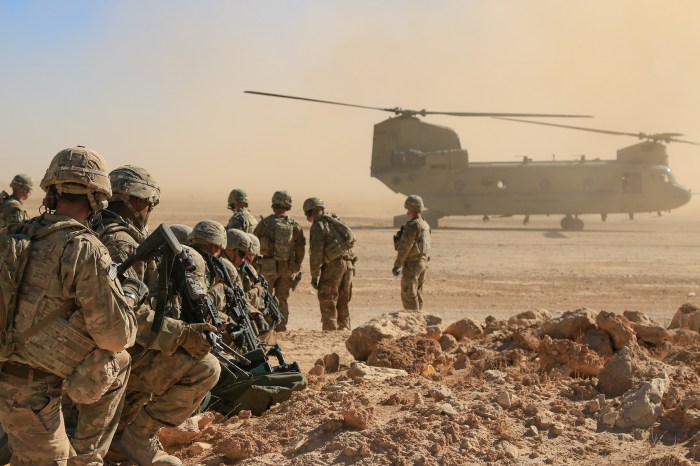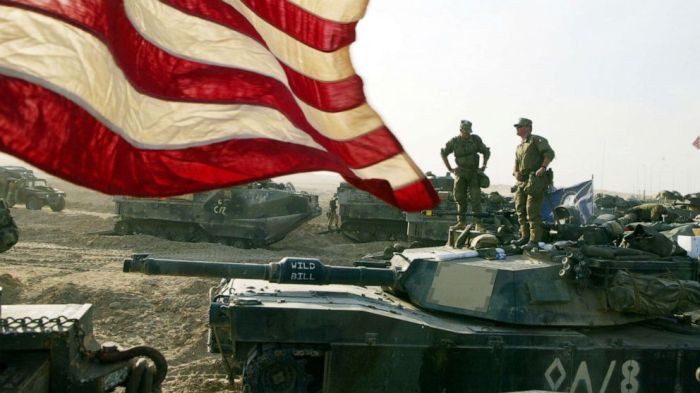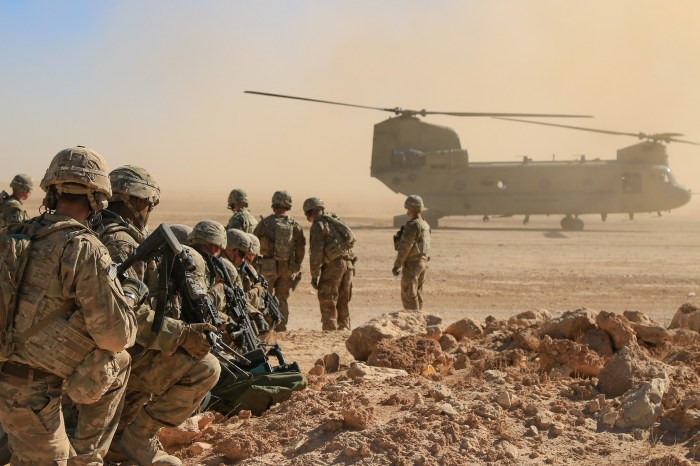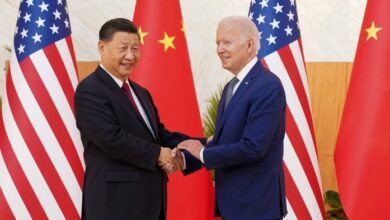
War on Terror FAQs: Understanding a Global Conflict
War on Terror FAQs sets the stage for this enthralling narrative, offering readers a glimpse into a story that is rich in detail and brimming with originality from the outset. The “War on Terror,” a term that has become synonymous with a global struggle against terrorism, has shaped the 21st century in profound ways.
It’s a topic that evokes strong emotions, raises complex questions, and continues to dominate headlines. This series of FAQs aims to shed light on this complex issue, exploring its origins, objectives, strategies, and lasting impact.
We’ll delve into the historical context that gave rise to the “War on Terror,” examining key events that propelled this global conflict into the spotlight. We’ll unpack the objectives and strategies employed, exploring the tactics and challenges faced by those involved.
The global impact and consequences of the “War on Terror” will be examined, including its social, political, and economic ramifications. Finally, we’ll discuss the current state of the “War on Terror” and its evolving nature, considering its ongoing challenges and potential implications for the future.
What is the War on Terror?

The “War on Terror” is a term used to describe the global campaign launched by the United States and its allies following the September 11, 2001, terrorist attacks. It is a broad term that encompasses a range of military, political, and social initiatives aimed at combating terrorism, both domestically and internationally.
The War on Terror has been a defining feature of the 21st century, shaping global politics, foreign policy, and security practices. Its origins lie in the events of 9/11, when Al-Qaeda, a transnational terrorist organization, hijacked four commercial airplanes and carried out coordinated attacks on the World Trade Center in New York City and the Pentagon in Arlington, Virginia.
The attacks resulted in the deaths of nearly 3,000 people and sparked widespread fear and anger around the world.
Key Events Leading to the Declaration of the War on Terror
The events of 9/11 were a turning point in the global fight against terrorism. In response to the attacks, the United States government declared a “War on Terror” and launched a series of military operations and security measures. These included:
- The invasion of Afghanistan in 2001, aimed at overthrowing the Taliban regime, which had harbored Al-Qaeda.
- The invasion of Iraq in 2003, based on the belief that Iraq possessed weapons of mass destruction and was linked to Al-Qaeda.
- The establishment of the Department of Homeland Security in 2002, to coordinate national security efforts and improve border security.
- The passage of the Patriot Act in 2001, which expanded the government’s surveillance powers.
Countries and Organizations Involved in the War on Terror
The War on Terror has involved a wide range of countries and organizations, including:
- The United States: The United States has been the leading force in the War on Terror, deploying troops to Afghanistan, Iraq, and other countries, and providing significant financial and military support to allies.
- NATO: The North Atlantic Treaty Organization (NATO) has played a significant role in the War on Terror, providing troops and support for operations in Afghanistan and other countries.
- The United Kingdom: The United Kingdom has been a key ally of the United States in the War on Terror, providing troops, intelligence, and financial support.
- Australia: Australia has also been a significant contributor to the War on Terror, deploying troops to Afghanistan and Iraq, and providing financial and military support.
- Al-Qaeda: Al-Qaeda is a transnational terrorist organization responsible for the 9/11 attacks. It has been a major target of the War on Terror, with its leadership and infrastructure targeted in numerous military operations and counterterrorism efforts.
- ISIS: The Islamic State of Iraq and Syria (ISIS) is another major terrorist organization that has emerged in recent years. ISIS has seized control of territory in Iraq and Syria, carrying out brutal attacks and atrocities. It has been the target of a global counterterrorism campaign, involving the United States, its allies, and regional partners.
Objectives of the War on Terror

The War on Terror, declared by the United States in the aftermath of the 9/11 attacks, has been a complex and multifaceted undertaking with a range of objectives. These objectives, while initially focused on combating terrorism, have evolved over time, encompassing broader geopolitical aims.
Primary Objectives
The immediate and primary objective of the War on Terror was to dismantle terrorist organizations, primarily Al-Qaeda, and prevent future attacks. This involved targeting terrorist leaders, disrupting their networks, and eliminating their capabilities.
Strategic Goals
Beyond the immediate objective of combating terrorism, the War on Terror aimed to achieve broader strategic goals. These included:
- Preventing the spread of terrorism:This involved working with allies to counter the ideology and recruitment efforts of terrorist groups, as well as to address the root causes of terrorism, such as poverty, inequality, and political instability.
- Promoting democracy and human rights:The War on Terror was also seen as an opportunity to promote democratic values and human rights in countries where they were lacking. This involved supporting democratic movements, strengthening civil society, and promoting good governance.
- Strengthening international cooperation:The War on Terror required a coordinated international response, and the US sought to build stronger partnerships with allies to combat terrorism and address shared security threats.
Intended Outcomes
The intended outcomes of the War on Terror were to:
- Reduce the threat of terrorism:This involved weakening terrorist organizations, preventing them from carrying out attacks, and reducing their ability to operate.
- Promote stability and security:The War on Terror aimed to create a more stable and secure international environment by addressing the root causes of terrorism and by building stronger partnerships with allies.
- Advance US national interests:The War on Terror was seen as a way to advance US national interests by protecting its citizens from terrorism, promoting democracy and human rights, and strengthening its global leadership.
Key Strategies and Tactics
The War on Terror has involved a multifaceted approach, encompassing military interventions, counterterrorism operations, and diplomatic efforts. This section delves into the key strategies and tactics employed in this global conflict.
Military Interventions
Military interventions have been a prominent aspect of the War on Terror, aiming to dismantle terrorist organizations and their support networks.
The “War on Terror” has raised many questions, from its definition to its effectiveness. One thing that’s often overlooked is the impact these conflicts have on vulnerable populations. It’s important to remember that the causes of hunger are related to poverty , and war exacerbates these issues.
Understanding the complexities of these situations is crucial when considering the “War on Terror” FAQs, as they involve far more than just military strategies.
- The invasion of Afghanistan in 2001: Following the 9/11 attacks, the United States, alongside its allies, launched a military campaign in Afghanistan to overthrow the Taliban regime, which had provided safe haven to al-Qaeda. This intervention led to the removal of the Taliban from power and the capture or killing of key al-Qaeda leaders.
- The invasion of Iraq in 2003: The US-led invasion of Iraq, based on the belief that Saddam Hussein’s regime possessed weapons of mass destruction and supported terrorism, resulted in the overthrow of Hussein’s government. While the invasion did not directly target al-Qaeda, it contributed to the rise of sectarian violence and instability in the region, which created opportunities for terrorist groups to flourish.
Counterterrorism Tactics
Counterterrorism tactics involve a range of strategies and techniques aimed at preventing, disrupting, and responding to terrorist threats.
The “War on Terror” FAQs often delve into the complexities of global security and international relations. However, it’s important to remember that these issues are intertwined with other critical concerns, such as the role of pharmaceutical corporations and AIDS , which can have significant implications for vulnerable populations impacted by conflict and instability.
Understanding these interconnected challenges is crucial for crafting effective strategies to address the multifaceted nature of the “War on Terror” and its impact on global health and security.
- Intelligence gathering and surveillance: Intelligence agencies play a crucial role in identifying potential threats, gathering information on terrorist groups, and tracking their activities. This involves utilizing various methods, including human intelligence, signals intelligence, and open-source information.
- Targeted killings and drone strikes: The use of targeted killings and drone strikes has become a controversial aspect of the War on Terror. This strategy involves eliminating high-value terrorist targets, often using unmanned aerial vehicles (UAVs) equipped with missiles. While proponents argue that these strikes are effective in neutralizing threats, critics raise concerns about civilian casualties and the potential for unintended consequences.
The “War on Terror” has had a profound impact on global development, prompting questions about its effectiveness and long-term consequences. Understanding the UN’s role in addressing development issues, especially in conflict-affected regions, is crucial, as seen in their work on the united nations on development issues page.
These efforts are essential to mitigating the collateral damage of conflict and fostering sustainable development, which are key considerations when analyzing the “War on Terror” and its implications for the future.
- Law enforcement operations: Law enforcement agencies are responsible for investigating and prosecuting terrorist activities, often working in conjunction with intelligence agencies. This involves gathering evidence, conducting raids, and apprehending suspects.
- Cybersecurity measures: Terrorist groups increasingly utilize cyberspace for communication, recruitment, and propaganda purposes. Counterterrorism efforts involve strengthening cybersecurity measures to prevent terrorist attacks and disrupt their online activities.
Effectiveness of Strategies and Tactics
The effectiveness of different strategies and tactics in the War on Terror has been subject to debate.
- Military interventions: While military interventions have been successful in achieving short-term objectives, such as removing regimes from power, their long-term impact has been mixed. The prolonged presence of foreign troops in Afghanistan and Iraq has led to instability, resentment, and the emergence of new terrorist groups.
- Counterterrorism tactics: Counterterrorism tactics have been effective in disrupting terrorist operations and preventing attacks. However, the use of targeted killings and drone strikes has raised ethical and legal concerns, and their effectiveness in addressing the root causes of terrorism is questionable.
- Diplomacy and development: Diplomacy and development efforts aim to address the underlying factors that contribute to terrorism, such as poverty, inequality, and political grievances. These strategies are crucial for long-term success in combating terrorism.
Global Impact and Consequences
The War on Terror, initiated after the 9/11 attacks, has had profound and far-reaching consequences across the globe. Its impact has been felt in various regions and countries, shaping their social, political, and economic landscapes.
Social Consequences
The War on Terror has significantly impacted societies worldwide, leading to widespread social changes and challenges.
- Increased Islamophobia and Discrimination:The War on Terror has fueled Islamophobia and discrimination against Muslims in many countries. This has resulted in increased hate crimes, profiling, and prejudice, creating a climate of fear and distrust.
- Erosion of Civil Liberties:In the name of security, governments have implemented surveillance programs and expanded their powers, often at the expense of civil liberties. This has raised concerns about privacy, freedom of expression, and due process.
- Displacement and Refugee Crisis:The War on Terror has resulted in mass displacement and a global refugee crisis. Millions of people have been forced to flee their homes due to conflict, persecution, and instability in war-torn regions.
- Social Polarization and Division:The War on Terror has contributed to social polarization and division within societies. It has created a sense of us versus them, fueling tensions and mistrust between different communities.
Political Consequences
The War on Terror has had significant political consequences, impacting global power dynamics, international relations, and the balance of power.
- Rise of Authoritarian Regimes:The War on Terror has provided an opportunity for authoritarian regimes to consolidate their power and suppress dissent. This has been particularly evident in countries where the War on Terror has been used as a pretext for cracking down on political opposition.
- Weakening of International Institutions:The War on Terror has undermined the authority and effectiveness of international institutions, such as the United Nations. The unilateral actions of some countries have eroded trust and cooperation among nations.
- Increased Military Spending and Arms Race:The War on Terror has led to a surge in military spending and an arms race, diverting resources from other crucial areas such as education, healthcare, and infrastructure.
- Shifting Power Dynamics:The War on Terror has shifted the balance of power in the world, with some countries emerging as dominant players while others have lost influence.
Economic Consequences
The War on Terror has had significant economic consequences, impacting global trade, investment, and development.
- Economic Instability:The War on Terror has destabilized economies in war-torn regions, leading to widespread poverty, unemployment, and inequality.
- Increased Security Costs:The War on Terror has led to a significant increase in security costs for governments and businesses worldwide. This has put a strain on public finances and hampered economic growth.
- Impact on Tourism and Trade:The War on Terror has had a negative impact on tourism and trade in some regions, due to security concerns and travel restrictions.
- Diversion of Resources:The War on Terror has diverted resources from development projects and social programs, hindering economic progress in many countries.
Ethical Considerations and Controversies
The War on Terror has raised numerous ethical considerations and controversies.
- Extrajudicial Killings and Drone Strikes:The use of drone strikes and extrajudicial killings has been widely criticized for its lack of transparency, accountability, and collateral damage.
- Torture and Abuse:The use of torture and abuse by governments and security forces in the name of combating terrorism has raised serious ethical concerns.
- Surveillance and Privacy:The expansion of surveillance programs and the collection of personal data have raised concerns about privacy, freedom of expression, and the right to anonymity.
- Military Interventions and Regime Change:The use of military interventions and regime change as a strategy for combating terrorism has been criticized for its unintended consequences, such as instability and the rise of new threats.
The War on Terror Today: War On Terror Faqs
The War on Terror, initiated in the aftermath of the 9/11 attacks, continues to evolve in the 21st century. While the initial focus was on dismantling Al-Qaeda and preventing further attacks on the United States, the conflict has expanded to encompass a wide range of terrorist organizations and threats.
The Evolving Nature of Terrorism
The nature of terrorism has shifted significantly since the early 2000s. The rise of new terrorist groups, such as ISIS, and the increasing use of technology for communication, recruitment, and planning have posed new challenges for global security.
- Increased Decentralization:Many terrorist groups have decentralized their operations, making them more difficult to track and target. This decentralization is often facilitated by the use of social media and encrypted communication platforms.
- The Rise of Ideological Extremism:The War on Terror has inadvertently contributed to the rise of extremist ideologies, particularly among marginalized communities. This has led to the emergence of new terrorist groups with different motives and goals.
- The Use of Technology:Terrorist groups have become increasingly sophisticated in their use of technology. They utilize social media for propaganda, recruitment, and communication, and employ advanced techniques for planning and carrying out attacks.
Challenges to the War on Terror
The War on Terror faces numerous challenges, including the evolving nature of terrorism, the complexities of international relations, and the ethical dilemmas associated with counterterrorism measures.
- The Difficulty of Defining Terrorism:There is no universally accepted definition of terrorism, making it difficult to distinguish between legitimate armed groups and terrorist organizations.
- The Role of Foreign Policy:The War on Terror has often been intertwined with foreign policy objectives, leading to unintended consequences and exacerbating existing conflicts.
- The Ethics of Counterterrorism:The use of drones, targeted killings, and other counterterrorism measures raises serious ethical concerns about the balance between security and human rights.
The Future of the War on Terror, War on terror faqs
The War on Terror is likely to continue for the foreseeable future, with new challenges and threats emerging. However, the future of the conflict will depend on a range of factors, including the effectiveness of counterterrorism strategies, the evolution of terrorist groups, and the global political landscape.
- The Importance of Counterterrorism Strategies:Effective counterterrorism strategies will be crucial in combating the evolving nature of terrorism. This includes addressing the root causes of terrorism, strengthening international cooperation, and investing in intelligence gathering and analysis.
- The Role of Diplomacy and Development:Addressing the underlying factors that contribute to terrorism, such as poverty, inequality, and political instability, will be essential for long-term solutions. This requires a focus on diplomacy, development, and human rights.
- The Impact of Technology:The use of technology by both terrorist groups and governments will continue to shape the War on Terror. This includes the development of new technologies for surveillance, intelligence gathering, and counterterrorism operations.






